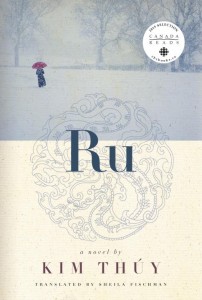February 10, 2015
Ru by Kim Thúy
 My favourite thing about Canada Reads has been the reading, the strange context that arises from particular and unlikely groupings of different books, how books become oddly illuminated by these connections. For example, it would never have occurred to me to read Ru by Kim Thúy in light of The Inconvenient Indian by Thomas King. It hadn’t really occurred to me to read Ru at all, actually. I figured everyone had already read it for me. And I had been expecting something familiar—an immigrant’s tale like I’d encountered before, a literary tradition beginning with Frances Brooke in the 18th century, right on to Susannah Moodie, and Jane Urquhart with Away, and so on and so on.
My favourite thing about Canada Reads has been the reading, the strange context that arises from particular and unlikely groupings of different books, how books become oddly illuminated by these connections. For example, it would never have occurred to me to read Ru by Kim Thúy in light of The Inconvenient Indian by Thomas King. It hadn’t really occurred to me to read Ru at all, actually. I figured everyone had already read it for me. And I had been expecting something familiar—an immigrant’s tale like I’d encountered before, a literary tradition beginning with Frances Brooke in the 18th century, right on to Susannah Moodie, and Jane Urquhart with Away, and so on and so on.
But Kim Thúy’s novel turned out to have a lot more in common with Thomas King’s book than a two hundred year old settler tale. First, Thúy similarly jettisons chronology, her narrative weaving in and out of time, the past forever present. And as King uses his own experience and story-telling voice (lyricism) to inform his factual non-fiction, Thúy uses the same tools for her autobiographical novel. The boundaries of genre are blurred, as boundaries continue to be blurred through the entirety of Ru, the uselessness of borders being one of the book’s central themes.
A slim and quiet book, Ru is powerful as a disturber of binaries. Between North and South Vietnam, French and English Canada, between then and now, here and there, day and night. An Tinh, the narrator, immigrates to Quebec in the 1970s, escaping Vietnam via a Malaysian refugee camp. But she returns to her home country years later, lives and works there. The narrative moves between her time in Hanoi as an adult, her childhood in Saigon, her years growing up in Quebec, her present existence working and living in Montreal, a mother two to sons (one of whom is autistic, which becomes an interesting branch of this novel which is so much about motherhood and daughterhood, not to mention mother tongues and mother countries).
The trajectory of An Tinh’s tale is a hopeful one: from peril to safety, from poverty to prosperity, from war to peace, from dream to reality. Though it’s more complicated than that: there is trauma and loss, and An Tinh addresses a fellow immigrant from Vietnam, “our own ambivalence, our hybrid state: half this, half that, nothing at all and everything at once.” But still, it’s the everything that the reader takes away from the novel. It is a story of fullness.
And yet. To read about the uselessness and blurring of borders in the context of The Inconvenient Indian is a peculiar exercise. I can’t help but think about the forced assimilation, a national policy for centuries. That perhaps the template of Ru, while analogous to First Nations experiences in some ways (trauma, an ever-present past), is far too simplistic to apply to King’s history. We’ve done enough breaking barriers and blurring borders over the years, and perhaps a far better approach now might be to begin to respect them.





